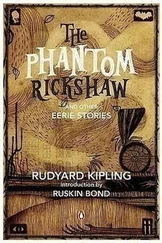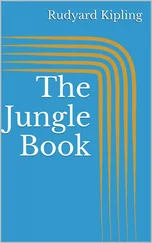"He came only two nights later," said Bagheera, cowering a little; "and of that long, sweet grass that pleased thee so he gathered more than any Man–cub could eat in all the nights of the Rains. That was no fault of mine."
"He did not come upon the night when I sent him the word. No, he was trumpeting and running and roaring through the valleys in the moonlight. His trail was like the trail of three elephants, for he would not hide among the trees. He danced in the moonlight before the houses of the Man–Pack. I saw him, and yet he would not come to me; and I am the Master of the Jungle!"
"It was the Time of New Talk," said the panther, always very humble. "Perhaps, Little Brother, thou didst not that time call him by a Master–word? Listen to Ferao, and be glad!"
Mowgli's bad temper seemed to have boiled itself away. He lay back with his head on his arms, his eyes shut. "I do not know—nor do I care," he said sleepily. "Let us sleep, Bagheera. My stomach is heavy in me. Make me a rest for my head."
The panther lay down again with a sigh, because he could hear Ferao practising and repractising his song against the Springtime of New Talk, as they say.
In an Indian Jungle the seasons slide one into the other almost without division. There seem to be only two—the wet and the dry; but if you look closely below the torrents of rain and the clouds of char and dust you will find all four going round in their regular ring. Spring is the most wonderful, because she has not to cover a clean, bare field with new leaves and flowers, but to drive before her and to put away the hanging–on, over–surviving raffle of half–green things which the gentle winter has suffered to live, and to make the partly dressed stale earth feel new and young once more. And this she does so well that there is no spring in the world like the Jungle spring.
There is one day when all things are tired, and the very smells, as they drift on the heavy air, are old and used. One cannot explain this, but it feels so. Then there is another day—to the eye nothing whatever has changed—when all the smells are new and delightful, and the whiskers of the Jungle People quiver to their roots, and the winter hair comes away from their sides in long, draggled locks. Then, perhaps, a little rain falls, and all the trees and the bushes and the bamboos and the mosses and the juicy–leaved plants wake with a noise of growing that you can almost hear, and under this noise runs, day and night, a deep hum. That is the noise of the spring—a vibrating boom which is neither bees, nor falling water, nor the wind in tree–tops, but the purring of the warm, happy world.
Up to this year Mowgli had always delighted in the turn of the seasons. It was he who generally saw the first Eye–of–the–Spring deep down among the grasses, and the first bank of spring clouds which are like nothing else in the Jungle. His voice could be heard in all sorts of wet, star–lighted, blossoming places, helping the big frogs through their choruses, or mocking the little upside–down owls that hoot through the white nights. Like all his people, spring was the season he chose for his flittings—moving, for the mere joy of rushing through the warm air, thirty, forty, or fifty miles between twilight and the morning star, and coming back panting and laughing and wreathed with strange flowers. The Four did not follow him on these wild ringings of the Jungle, but went off to sing songs with other wolves. The Jungle People are very busy in the spring, and Mowgli could hear them grunting and screaming and whistling according to their kind. Their voices then are different from their voices at other times of the year, and that is one of the reasons why spring in the Jungle is called the Time of New Talk.
But that spring, as he told Bagheera, his stomach was changed in him. Ever since the bamboo shoots turned spotty–brown he had been looking forward to the morning when the smells should change. But when the morning came, and Mor the Peacock, blazing in bronze and blue and gold, cried it aloud all along the misty woods, and Mowgli opened his mouth to send on the cry, the words choked between his teeth, and a feeling came over him that began at his toes and ended in his hair—a feeling of pure unhappiness, so that he looked himself over to be sure that he had not trod on a thorn. Mor cried the new smells, the other birds took it over, and from the rocks by the Waingunga he heard Bagheera's hoarse scream—something between the scream of an eagle and the neighing of a horse. There was a yelling and scattering of bandar–log in the new–budding branches above, and there stood Mowgli, his chest, filled to answer Mor, sinking in little gasps as the breath was driven out of it by this unhappiness.
He stared all round him, but he could see no more than the mocking bandar–log scudding through the trees, and Mor, his tail spread in full splendor, dancing on the slopes below.
"The smells have changed," screamed Mor. "Good hunting, Little Brother! Where is thy answer?"
"Little Brother, good hunting!" whistled Chil the Kite and his mate, swooping down together. The two baffed under Mowgli's nose so close that a pinch of downy white feathers brushed away.
A light spring rain—elephant–rain they call it—drove across the Jungle in a belt half a mile wide, left the new leaves wet and nodding behind, and died out in a double rainbow and a light roll of thunder. The spring hum broke out for a minute, and was silent, but all the Jungle Folk seemed to be giving tongue at once. All except Mowgli.
"I have eaten good food," he said to himself. "I have drunk good water. Nor does my throat burn and grow small, as it did when I bit the blue–spotted root that Oo the Turtle said was clean food. But my stomach is heavy, and I have given very bad talk to Bagheera and others, people of the Jungle and my people. Now, too, I am hot and now I am cold, and now I am neither hot nor cold, but angry with that which I cannot see. Huhu! It is time to make a running! To–night I will cross the ranges; yes, I will make a spring running to the Marshes of the North, and back again. I have hunted too easily too long. The Four shall come with me, for they grow as fat as white grubs."
He called, but never one of the Four answered. They were far beyond earshot, singing over the spring songs—the Moon and Sambhur Songs—with the wolves of the Pack; for in the springtime the Jungle People make very little difference between the day and the night. He gave the sharp, barking note, but his only answer was the mocking maiou of the little spotted tree–cat winding in and out among the branches for early birds' nests. At this he shook all over with rage, and half drew his knife. Then he became very haughty, though there was no one to see him, and stalked severely down the hillside, chin up and eyebrows down. But never a single one of his people asked him a question, for they were all too busy with their own affairs.
"Yes," said Mowgli to himself, though in his heart he knew that he had no reason. "Let the Red Dhole come from the Dekkan, or the Red Flower dance among the bamboos, and all the Jungle runs whining to Mowgli, calling him great elephant–names. But now, because Eye–of–the–Spring is red, and Mor, forsooth, must show his naked legs in some spring dance, the Jungle goes mad as Tabaqui…. By the Bull that bought me! am I the Master of the Jungle, or am I not? Be silent! What do ye here?"
A couple of young wolves of the Pack were cantering down a path, looking for open ground in which to fight. (You will remember that the Law of the Jungle forbids fighting where the Pack can see.) Their neck–bristles were as stiff as wire, and they bayed furiously, crouching for the first grapple. Mowgli leaped forward, caught one outstretched throat in either hand, expecting to fling the creatures backward as he had often done in games or Pack hunts. But he had never before interfered with a spring fight. The two leaped forward and dashed him aside, and without word to waste rolled over and over close locked.
Читать дальше












